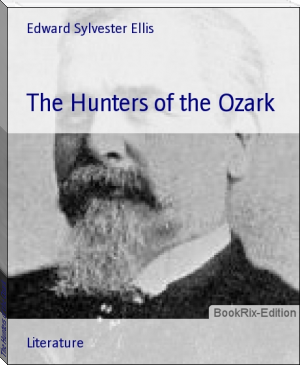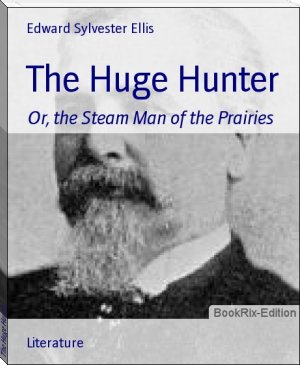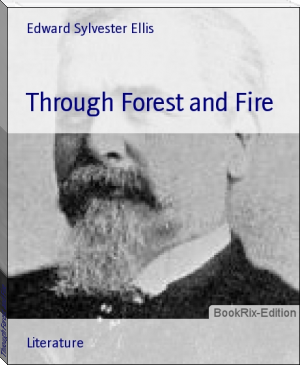The Hunters of the Ozark - Edward Sylvester Ellis (children's ebooks online .txt) 📗

- Author: Edward Sylvester Ellis
Book online «The Hunters of the Ozark - Edward Sylvester Ellis (children's ebooks online .txt) 📗». Author Edward Sylvester Ellis
of which the stream made a descent of a dozen or twenty feet. At ordinary times the creek wound languidly around these obstructions, forming many deep, clear pools of water, that afforded the best kind of fishing. There was so much room for the current that there was no call for it to make haste.
But you can understand how different it was when the creek was swollen by violent rains. It then dashed against the rocks, was thrown back, plunged against others, whirled about and charged upon still others, by which time it was a mass of seething foam, with the spray flying high in air, and a faint rainbow showing through the mist when the sun was shining. After fighting its way between and around and over these obstructions, the current emerged at the bottom one mass of boiling foam and dancing bubbles, which continued for several hundred feet before the effects of the savage churning that the water had received could be shaken off.
Now, it would be idle to say that these rapids were as dangerous as the famous whirlpool below Niagara Falls; for it would not only be untrue, but it would shut me out from taking Fred Linden safely through them: for I am bound to do that, since he is too good a fellow to sacrifice at this early stage of my story, and you would not forgive me for doing so.
But all the same the danger was great, and was enough to cause the bravest man to shrink from attempting the passage. Fred would have been glad to shrink from going through, but since that was beyond his power he did the wisest course--faced about and kept his wits with him.
There was one consolation--the suspense could last but a few moments; he was sure to emerge from the lower falls within the space of a minute, whether alive or dead.
The first object that caught his eye was his broken canoe. Naturally it was but a short distance below him, though it had gained a little while he was struggling so hard to make land. It was turned on its side, spinning sometimes one way and then whirling the other, according to the whim of the current; then sea-sawing up and down, until all at once it shot upward like a huge sturgeon, which sometimes flings its whole length out of the water.
Another point must be named that was gained by this facing about of Fred Linden. Since he was going with the current he kept pace with every thing else that was afloat, and he was therefore in no danger from the trees and branches that had caused him so much, and, in fact, nearly all his trouble.
At the moment he was about to enter the boiling rapids he found himself partly entangled in the branches of a large uprooted tree that was dancing about in a crazy fashion.
"This may help to shield me from being dashed against the rocks," was his thought, as he seized hold of a thick limb close to the point where it put out from the trunk; "at any rate I don't see that it can make matters any worse."
The act of Fred Linden in grasping the limb saved his life. The next moment he was whirled hither and thither, half strangled with foam, head now in air, now beneath the surface, his body grazing the jagged rocks by the closest possible shave, and all the time shooting forward with dizzying rapidity, until at last he emerged into the calmer water below as well and hearty as he ever was in all his life.
CHAPTER XI.
TRAMPING SOUTHWARD.
An ejaculation of thankfulness escaped Fred Linden when he found himself floating in the comparatively still water below the rapids, and he knew that although he was pretty well bruised, none of his bones was broken. He let go of the limb of the tree that had served him so well, and flirting the water from his eyes, struck out with his old time vigor for the shore, toward which he had started in the canoe.
When Terry Clark saw his friend go spinning into the whirlpool, he scrambled back from the trunk of the tree, on which he had found refuge, and ran at full speed down the bank. Fast as he went, he was just in time to see Fred swimming through the foaming waters toward the land.
"Give me yer hand!" called out the delighted youngster; "there isn't any body in the wide wurruld that could bate that onless it is mesilf, and I couldn't do it."
"Whew!" exclaimed Fred, as he laboriously clambered up the steep bank; "that was the biggest lot of swimming and diving crowded into the space of a minute or two that I ever knew; I wouldn't like to take such a trip each day."
"And I'm thinkin' that it'll be a few days after this whin we try it agin," added Terry, delighted to see his loved comrade before him unharmed; "I jist give up when I seen you plunge in among the rocks, and was wonderin' how your father and mother and sister Edith would faal when I should be luggin' your dead body home."
"I'm thankful that you haven't _that_ to do," said Fred with an earnestness that could not be mistaken; "but come, the clothes of us both are dripping, and we can't get away any too soon."
It was not far to walk, and a few minutes later they reached the other side of the clearing, where the cluster of cabins stood. The first living object on which their eyes rested was Brindle, lying on the ground and chewing her cud with an air of contentment which belongs exclusively to her kind, or rather kine.
The boys laughed and Terry said:
"If she had such a thing as conscience she wouldn't be takin' things in that aisy style, after givin' us a duckin' that come nigh bein' our last one."
"You are right, Terry, but what did you do with that bell that Deerfoot took away from the Winnebago?"
"I lift it wid my gun on the other side of the creek; I didn't want it tollin' our funeral knell all the time we was goin' through the rapids and splittin' the rocks to pieces by bangin' our heads agin them."
"It is just as well, for the creek will be so low that there will be no danger in crossing it to-morrow, and you can get the bell again; well, here we are at home."
The boys separated, and at the same moment, each entered the cabin where he lived. They were only a short distance apart. Several men and a number of the lads, some older and some younger than the two in whom we are interested, were moving about, and looked curiously at the dripping figures. A couple asked an explanation of Fred, but he laughingly answered that he would tell them after he had got dry, and immediately disappeared in his own house.
Mrs. Linden and Edith, her daughter, who was two years younger than Fred, looked up in surprise when they saw the state of the lad.
"Terry and I started to paddle across the creek, that is higher than usual, and were overturned by a tree that stove in the side of the boat and gave us a ducking."
Having heard this explanation his folks seemed to feel no more curiosity about it. The lad passed into his room, he being one of those fortunate ones who had two complete suits of clothing, with the exception of cap and shoes. It took him but a short time to effect the change, when he reappeared, placing his foot and head gear near the fire, where they would soon dry.
The home of Fred Linden may be taken as a type of the best that were found on the frontier. As a matter of course, it was made of logs, with a stone chimney so huge that it projected like an irregular bay window from the rear. The fire-place took up the greater part of one side of the house, where the immense blocks of oak and hickory not only diffused a cheery warmth through the lower portion, but sent fully one-half the heat up the enormous throat of the chimney.
The large room, which served for parlor, sitting and dining room, was furnished simply, but comfortably, with plain chairs, a bench, spinning-wheel, a rocking-chair, table, a few cheap pictures and the indispensable cooking utensils. There was no stove, every thing being prepared in the fire-place. At that day, as you well know, no one had ever dreamed of using coal as an article of fuel, and the old-fashioned stoves were exceedingly few in number. Carpets, of course, were not thought of, though the rough floor was kept clean enough to serve as a table for food.
A rifle rested on two deer prongs over the mantel-piece, and there seemed to be any number of knick-knacks about the room, though it would have been found that nearly every one had a distinct use in the household.
Two rooms were connected on the same floor with the larger apartment. One of these served as the sleeping quarters for the parents when Mr. Linden was at home, and the other for Edith, while Fred occupied the loft, which had the rafters for a ceiling, and extended over half the lower floor. During the absence of the father, Edith and her mother used one room, while Fred had the other.
Noon had passed when the son came home, and his substantial dinner of venison--procured some days before by Fred himself--brown bread, potatoes, butter and milk, were awaiting him. Taking his place at the table, he ate as only a rugged, growing boy of sixteen can eat.
He made no further mention of the dangerous adventure that had just befallen him, but gave the full particulars of Terry Clark's encounter with the Winnebago Indian, who stole the bell from the cow, and tried to have a little sport at the expense of the boy. It was an interesting story, and mother and daughter listened with rapt attention. Edith, who was a bright girl, and very fond of her brother, asked many questions as to how the Winnebago looked, what he said, and whether he really meant to kill poor Terry. Then her interest suddenly transferred itself to Deerfoot, and she plied Fred with all sorts of queries, until he laughingly told her that she was asking them two and three times over, and really he had nothing more to tell.
Then Fred drew out the moist and soiled bit of paper that he had taken from his other clothes, and which contained the message of his father. This, of course, caused a sensation, for it made known the fact that the son was to join his parent for several months. It would be supposed that this would cause some inconvenience, but in such a primitive community all were neighbors, and the chores and work that would have been done by Fred Linden would be cheerfully attended to by others. It was not until many years afterward, when the settlements became towns, that the social distinctions between families were formed.
During all the conversation, after it had been agreed that Fred should start alone on a hundred mile journey through the wild forest, nothing was said about such a thing as the personal danger attending it. And that, too, directly on the heels of the Winnebago's attempt on Terry Clark. The habit of self-reliance was taught to the children of the pioneers at such
But you can understand how different it was when the creek was swollen by violent rains. It then dashed against the rocks, was thrown back, plunged against others, whirled about and charged upon still others, by which time it was a mass of seething foam, with the spray flying high in air, and a faint rainbow showing through the mist when the sun was shining. After fighting its way between and around and over these obstructions, the current emerged at the bottom one mass of boiling foam and dancing bubbles, which continued for several hundred feet before the effects of the savage churning that the water had received could be shaken off.
Now, it would be idle to say that these rapids were as dangerous as the famous whirlpool below Niagara Falls; for it would not only be untrue, but it would shut me out from taking Fred Linden safely through them: for I am bound to do that, since he is too good a fellow to sacrifice at this early stage of my story, and you would not forgive me for doing so.
But all the same the danger was great, and was enough to cause the bravest man to shrink from attempting the passage. Fred would have been glad to shrink from going through, but since that was beyond his power he did the wisest course--faced about and kept his wits with him.
There was one consolation--the suspense could last but a few moments; he was sure to emerge from the lower falls within the space of a minute, whether alive or dead.
The first object that caught his eye was his broken canoe. Naturally it was but a short distance below him, though it had gained a little while he was struggling so hard to make land. It was turned on its side, spinning sometimes one way and then whirling the other, according to the whim of the current; then sea-sawing up and down, until all at once it shot upward like a huge sturgeon, which sometimes flings its whole length out of the water.
Another point must be named that was gained by this facing about of Fred Linden. Since he was going with the current he kept pace with every thing else that was afloat, and he was therefore in no danger from the trees and branches that had caused him so much, and, in fact, nearly all his trouble.
At the moment he was about to enter the boiling rapids he found himself partly entangled in the branches of a large uprooted tree that was dancing about in a crazy fashion.
"This may help to shield me from being dashed against the rocks," was his thought, as he seized hold of a thick limb close to the point where it put out from the trunk; "at any rate I don't see that it can make matters any worse."
The act of Fred Linden in grasping the limb saved his life. The next moment he was whirled hither and thither, half strangled with foam, head now in air, now beneath the surface, his body grazing the jagged rocks by the closest possible shave, and all the time shooting forward with dizzying rapidity, until at last he emerged into the calmer water below as well and hearty as he ever was in all his life.
CHAPTER XI.
TRAMPING SOUTHWARD.
An ejaculation of thankfulness escaped Fred Linden when he found himself floating in the comparatively still water below the rapids, and he knew that although he was pretty well bruised, none of his bones was broken. He let go of the limb of the tree that had served him so well, and flirting the water from his eyes, struck out with his old time vigor for the shore, toward which he had started in the canoe.
When Terry Clark saw his friend go spinning into the whirlpool, he scrambled back from the trunk of the tree, on which he had found refuge, and ran at full speed down the bank. Fast as he went, he was just in time to see Fred swimming through the foaming waters toward the land.
"Give me yer hand!" called out the delighted youngster; "there isn't any body in the wide wurruld that could bate that onless it is mesilf, and I couldn't do it."
"Whew!" exclaimed Fred, as he laboriously clambered up the steep bank; "that was the biggest lot of swimming and diving crowded into the space of a minute or two that I ever knew; I wouldn't like to take such a trip each day."
"And I'm thinkin' that it'll be a few days after this whin we try it agin," added Terry, delighted to see his loved comrade before him unharmed; "I jist give up when I seen you plunge in among the rocks, and was wonderin' how your father and mother and sister Edith would faal when I should be luggin' your dead body home."
"I'm thankful that you haven't _that_ to do," said Fred with an earnestness that could not be mistaken; "but come, the clothes of us both are dripping, and we can't get away any too soon."
It was not far to walk, and a few minutes later they reached the other side of the clearing, where the cluster of cabins stood. The first living object on which their eyes rested was Brindle, lying on the ground and chewing her cud with an air of contentment which belongs exclusively to her kind, or rather kine.
The boys laughed and Terry said:
"If she had such a thing as conscience she wouldn't be takin' things in that aisy style, after givin' us a duckin' that come nigh bein' our last one."
"You are right, Terry, but what did you do with that bell that Deerfoot took away from the Winnebago?"
"I lift it wid my gun on the other side of the creek; I didn't want it tollin' our funeral knell all the time we was goin' through the rapids and splittin' the rocks to pieces by bangin' our heads agin them."
"It is just as well, for the creek will be so low that there will be no danger in crossing it to-morrow, and you can get the bell again; well, here we are at home."
The boys separated, and at the same moment, each entered the cabin where he lived. They were only a short distance apart. Several men and a number of the lads, some older and some younger than the two in whom we are interested, were moving about, and looked curiously at the dripping figures. A couple asked an explanation of Fred, but he laughingly answered that he would tell them after he had got dry, and immediately disappeared in his own house.
Mrs. Linden and Edith, her daughter, who was two years younger than Fred, looked up in surprise when they saw the state of the lad.
"Terry and I started to paddle across the creek, that is higher than usual, and were overturned by a tree that stove in the side of the boat and gave us a ducking."
Having heard this explanation his folks seemed to feel no more curiosity about it. The lad passed into his room, he being one of those fortunate ones who had two complete suits of clothing, with the exception of cap and shoes. It took him but a short time to effect the change, when he reappeared, placing his foot and head gear near the fire, where they would soon dry.
The home of Fred Linden may be taken as a type of the best that were found on the frontier. As a matter of course, it was made of logs, with a stone chimney so huge that it projected like an irregular bay window from the rear. The fire-place took up the greater part of one side of the house, where the immense blocks of oak and hickory not only diffused a cheery warmth through the lower portion, but sent fully one-half the heat up the enormous throat of the chimney.
The large room, which served for parlor, sitting and dining room, was furnished simply, but comfortably, with plain chairs, a bench, spinning-wheel, a rocking-chair, table, a few cheap pictures and the indispensable cooking utensils. There was no stove, every thing being prepared in the fire-place. At that day, as you well know, no one had ever dreamed of using coal as an article of fuel, and the old-fashioned stoves were exceedingly few in number. Carpets, of course, were not thought of, though the rough floor was kept clean enough to serve as a table for food.
A rifle rested on two deer prongs over the mantel-piece, and there seemed to be any number of knick-knacks about the room, though it would have been found that nearly every one had a distinct use in the household.
Two rooms were connected on the same floor with the larger apartment. One of these served as the sleeping quarters for the parents when Mr. Linden was at home, and the other for Edith, while Fred occupied the loft, which had the rafters for a ceiling, and extended over half the lower floor. During the absence of the father, Edith and her mother used one room, while Fred had the other.
Noon had passed when the son came home, and his substantial dinner of venison--procured some days before by Fred himself--brown bread, potatoes, butter and milk, were awaiting him. Taking his place at the table, he ate as only a rugged, growing boy of sixteen can eat.
He made no further mention of the dangerous adventure that had just befallen him, but gave the full particulars of Terry Clark's encounter with the Winnebago Indian, who stole the bell from the cow, and tried to have a little sport at the expense of the boy. It was an interesting story, and mother and daughter listened with rapt attention. Edith, who was a bright girl, and very fond of her brother, asked many questions as to how the Winnebago looked, what he said, and whether he really meant to kill poor Terry. Then her interest suddenly transferred itself to Deerfoot, and she plied Fred with all sorts of queries, until he laughingly told her that she was asking them two and three times over, and really he had nothing more to tell.
Then Fred drew out the moist and soiled bit of paper that he had taken from his other clothes, and which contained the message of his father. This, of course, caused a sensation, for it made known the fact that the son was to join his parent for several months. It would be supposed that this would cause some inconvenience, but in such a primitive community all were neighbors, and the chores and work that would have been done by Fred Linden would be cheerfully attended to by others. It was not until many years afterward, when the settlements became towns, that the social distinctions between families were formed.
During all the conversation, after it had been agreed that Fred should start alone on a hundred mile journey through the wild forest, nothing was said about such a thing as the personal danger attending it. And that, too, directly on the heels of the Winnebago's attempt on Terry Clark. The habit of self-reliance was taught to the children of the pioneers at such
Free e-book «The Hunters of the Ozark - Edward Sylvester Ellis (children's ebooks online .txt) 📗» - read online now
Similar e-books:





Comments (0)